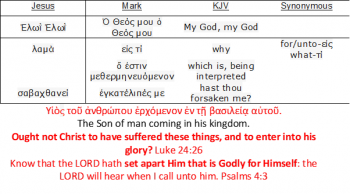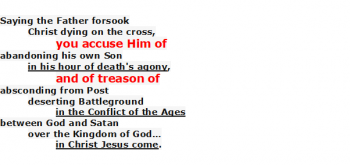A completely ungrounded complaint. If JBF does not know the meaning, no one can?
Mark 15:34,35
καὶ τῇ ἐνάτῃ ὥρᾳ ἐβόησεν ὁ Ἰησοῦς φωνῇ μεγάλῃ
At the ninth hour Jesus cried with a loud voice, saying,
Ἐλωῒ Ἐλωῒ λαμὰ σαβαχθανεί; ὅ ἐστιν μεθερμηνευόμενον
Eloi, Eloi, lama sabachtani? which is, being interpreted,
Ὁ Θεός μου ὁ Θεός μου, εἰς τί ἐγκατέλιπές με;
My God, my God, why hast thou separated / sanctified me?
Matthew 27:46,47
περὶ δὲ τὴν ἐνάτην ὥραν ἀνεβόησεν ὁ Ἰησοῦς φωνῇ μεγάλῃ λέγων
about the ninth hour Jesus cried with a loud voice, saying,
Ἡλεὶ Ἡλεὶ λεμὰ σαβαχθανεί; τοῦτ’ ἔστιν
Eli, Eli, lama sabachtani? that is to say,
Θεέ μου θεέ μου, ἵνα τί με
ἐγκατέλιπες;
My God, my God, why hast thou separated / sanctified (forsaken) me?
Jesus never was forsaken by God, He experienced it for no moment in time that the Presence of God watched not over Him, even in death and the grave. What it means to me is that because Jesus never experienced the absence of either the Father or Holy Spirit,
I never will.
Jesus, dying, giving into his Father's hands his spirit In Full Fellowship of Father Son and Holy Spirit "ENTERED INTO HIS GLORY".
There are two exact uses of Jesus' words. Psalm 22 and Isaiah 6:11-13.
Psalm 22:1,20-25 Verses 1,2 is a rhetorical or reverse in meaning, call. It means confirmation of the opposite of the literal. The answer to the supposed question is: No, God, You have NOT forsaken Me, You are NOT far from Me, but near, helping Me. You HEARD the words of my roaring, You were at Me, as I cried, o God, in daytime or in the night season and never failed me, while I was never silent, always cried to You. [Exodus 12:3,5 Ezegiël 39:29; 40:1b,4 Exodus 10,12,14 John 12:27,28; 17:1,4,5 Psalm 139:12,15,16]
'In Full Fellowship' of Father Son and Holy Spirit Jesus alive and conscious, willing and desiring, "according to the Scriptures" to obey and fulfil <
experienced> "all that the prophets have spoken concerning Him .. How the Christ ought to have suffered THESE THINGS AND ENTER INTO HIS GLORY". It is HERE that the Scriptures declare,
Mark 15:34,35
καὶ τῇ ἐνάτῃ ὥρᾳ ἐβόησεν ὁ Ἰησοῦς φωνῇ μεγάλῃ
At the ninth hour Jesus cried with a loud voice, saying,
Ἐλωῒ Ἐλωῒ λαμὰ σαβαχθανεί; ὅ ἐστιν μεθερμηνευόμενον
Eloi, Eloi, lama sabachtani? which is, being interpreted,
Ὁ Θεός μου ὁ Θεός μου, εἰς τί ἐγκατέλιπές με;
My God, my God, why hast thou separated / sanctified (forsaken) me?
Matthew 27:46,47
περὶ δὲ τὴν ἐνάτην ὥραν ἀνεβόησεν ὁ Ἰησοῦς φωνῇ μεγάλῃ λέγων
about the ninth hour Jesus cried with a loud voice, saying,
Ἡλεὶ Ἡλεὶ λεμὰ σαβαχθανεί; τοῦτ’ ἔστιν
Eli, Eli, lama sabachtani? that is to say,
Θεέ μου θεέ μου, ἵνα τί με
ἐγκατέλιπες;
My God, my God, why hast thou separated / sanctified (forsaken) me?
Jesus never was forsaken by God, He experienced it for no moment in time that the Presence of God watched not over Him, even in death and the grave. What it means to me is that because Jesus never experienced the absence of either the Father or Holy Spirit,
I never will.
Jesus, dying, giving into his Father's hands his spirit In Full Fellowship of Father Son and Holy Spirit "ENTERED INTO HIS GLORY".
Yes, <<
these words are a prophecy of the sufferings of our Lord>>, why limit the Lord's Suffering to the daytime? What about Jesus' Sufferings THAT SPECIFIC DAY IN ITS NIGHT BEFORE BECAUSE THAT AS MUCH AS WHAT OUR LORD WAS FACING THAT DAY IN ITS DAYTIME, WAS WHAT HE CRIED OUT FOR ON THE CROSS: "IS THIS THING WHAT THOU HAST SANCTIFIED-SEPARATED-HALLOWED, ME, FOR?" SINCE ETERNITY!
In Acts 2:27 quoting Psalm 16(LXX15):10, "Thou shalt not
leave [ἐνκαταλείψεις] my soul in hell" - "leave" - 'azab' - commit, fail, leave et al and in Acts 2:27 specifically "NOT leave" viz., "NOT forsake .. in hell".
2 Corinthians 4:9 confirms exactly the same concerning Jesus, suffering dying death, saying to His Father—ALL THE WHILE WITH HIM—, "I give my spirit INTO thy hands". Where or how did the Father <forsake> his Son?! NEVER! If the Father forsook his Son it would have been as good as having “sent” Jesus into eternal oblivion.
“
Forsake” in
Isaiah 6:11-13 LXX
Isaiah 6 και εγενετο του ενιαυτου ου απεθανεν οζιας ο βασιλευς ειδον τον κυριον καθημενον επι θρονου υψηλου και επηρμενου και πληρης ο οικος της δοξης αυτου
11And I said, How long, O Lord? And He said, until the cities be deserted
11 και ειπα εως ποτε κυριε και ειπεν εως αν ερημωθωσιν πολεις
by reason of their not being inhabited,
παρα μη κατοικεισθαι
and the houses by reason of there being no men
και οικοι παρα το μη ειναι ανθρωπους
and the land shall be left desolate.
και η γη καταλειφθησεται ερημος.
12 And after this God shall far off remove the men.
12 Και μετα ταυτα μακρυνει ο θεος τους ανθρωπους.
But they that are left upon the earth shall be multiplied
Και οι εγκαταλειφθεντες επι της γης πληθυνθησονται
13 and yet, there shall not be a tenth (left saved) upon it
13 και ετι, επ αυτης εστιν το επιδεκατον
and again, it shall be for a spoil as a turpentine tree
και παλιν, εσται εις προνομην ως τερεβινθος
and as an acorn when it falls out of its husk.
και ως βαλανος οταν εκπεση απο της θηκης αυτης.
(*Westcott-Hort & Strongs
G2641 V-APPNP καταλειφθεντες)
Antonyms changed into Synonyms
In order to change the LXX antonyms καταλειφθησεται–“be left desolate”, and ενκαταλειφθεντες–“be left saved”, into synonyms, simply REMOVE the first Preposition ‘εν’ in εγκαταλειφθεντες.
and the land shall be left desolate…but they that are left saved upon the earth shall be multiplied.
και η γη καταλειφθησεται ερημος…και οι εγκαταλειφθεντες επι της γης πληθυνθησονται.
Why? Because <<Enkataleipo means to forsake or abandon>> says Steve Owen. But Steve Owen FORGETS <forsake or abandon> is not what is written or what Mark or Matthew wrote or what Jesus, said-- is not even what Mark or Matthew "interpreted", but is what the translators decided "Sabachthani" - whether Hebrew or Aramaic (it does not matter!) -, must mean.
It is what the Holy Spirit decided "Sabachthani" means. It's right there in the Bible. Matthew 17:46;
Mark 15:34. "My God. My God, "Is this what You have separated / sanctified Me for?" And the answer was, Yes, as per Psalm 22:1,2 and ALL Scripture confirming the INTEGRITY OF THE CHRIST OF GOD.




